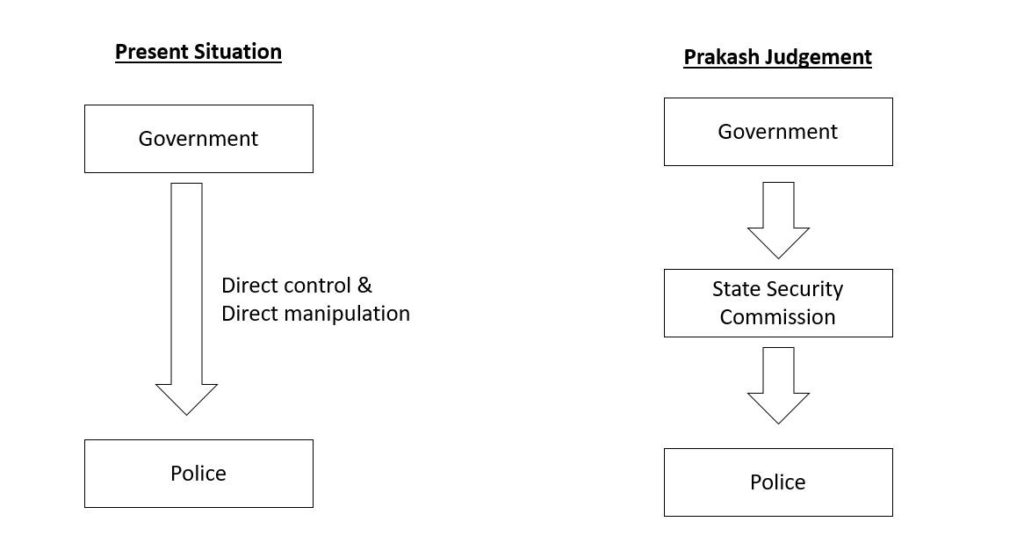Table of Contents
Police Governance
This article deals with ‘Police Governance.’ This is part of our series on ‘Governance’ which is important pillar of GS-2 syllabus . For more articles , you can click here
Introduction
- Police in almost all states is governed by Police Act , 1861 which was made to secure & strengthen Raj. Now same is used by Government to strengthen its hold
- There have been many number of commissions, both at the State and Central level – State Police Commissions, National Police Commission, Gore Committee, Ribeiro Committee, Padmanabhaiah Committee, Malimath Committee, to name only a few
Why in news?
This topic remains in news always. Eg :-
| June 2020 | Rage over custodial death of father-son duo in Tamil Nadu |
Why do we need police reforms ?
- Biggest problem is Political Interference .
- Economic progress cannot be sustained if we are not able to generate a safe and secure environment.
- Numbers: global average ratio of police-population is 270 to 1,00,000, where it is 120 in India.
- Low standard of Criminal Investigation
- Human right violation : Inspite the known fact that Police indulge in Human Rights violations like custodial deaths and fake encounters ,but convictions are few. Eg : Tuticorin custodial killing case of 2020 in which father-son duo was killed by police leading to huge furore in the country.
- Lack of expertise in Collection and analysis of preventive intelligence
- Outdated arms and equipments: as seen in 26/11 attacks.
- Lack of proper training.
Prakash Singh judgement,2006
Based on recommendation of various committees , SC gave broad guidelines to be implemented to reform Police in India
Directive 1
Constitute a State Security Commission (SSC) to:
- Ensure that the state government does not exercise unwarranted influence or pressure on police
- Lay down broad policy guideline and
- Evaluate the performance of the state police
How State Security Commission will help

Directive 2
- Ensure that the DGP is appointed through merit based transparent process and secure a minimum tenure of two years.
Directive 3
Ensure that other police officers on operational duties (including SSP (incharge of District) & SHO ( in-charge of a police station)) are also provided a minimum tenure of two years.
Directive 4
- Separate the investigation and law and order functions of the police
Directive 5
- Set up a Police Establishment Board (PEB) to decide transfers, postings, promotions of police officers.
Directive 6
- Set up a Police Complaints Authority (PCA) at state level to inquire into public complaints against police officers .
Directive 7
- Set up a National Security Commission (NSC) at the union level to prepare a panel for selection and placement of Chiefs of the Central Police Organisations (CPO) with a minimum tenure of two years.
Are these directives implemented ?
- Almost no state seems willing to implement police reforms in letter and spirit. 17 states have passed new Acts while 12 have issued executive orders. But concerted efforts have been made by all to circumvent the SC directions . Thomas Committee, appointed by the Supreme Court to monitor the implementation of its directions in various states, in its report in 2010 deplored that “practically no state has fully complied with those directives so far, in letter and spirit”.
- Main lynchpin of the directive was formation of State Security Commission (SSC) with members from the government, judiciary and civil society. But 17 States which have made SSC , it’s composition is flawed . Most states have avoided having the opposition leader in commission and independent members have been kept away.
- Most states have refused to give more than a one-year fixed tenure to DGP . Reasons for DGP’s removal tenure have been kept vague with grounds ranging from ‘public interest’ and ‘administrative exigencies’ to ‘any other reason’.
- Except Kerala and Karnataka, no state has provided for complete separation of law and order and investigation duties.
- Centre, too, has been dragging its feet on the issue. It has as not yet set up the National Security Commission.
Parkash Committee Report (June 2016)
Was formed in wake of riots in Haryana during Jat agitation in which property worth billions was damaged and more than 30 persons were killed.
- It tells the story of institutional decay in the state’s bureaucracy.
- Former chief ministers of the state centralised powers in their own office to extend that officials have started to look upto their political masters even to exercise their inherent powers. (there are some inherent powers which police officers can exercise on their own but situation has gone that far that officers arent exercising these powers on their own too)
- Political interference in recruitment and postings has played havoc with the police force which has come to be dominated by the dominant caste of the state. The fallout of this was collusion with rioters, desertions and an obvious caste bias.
Modernising of Police Force Scheme
- Launched in 2000 by Ministry of Home Affairs
Aim
- To modernize police
- To equip the police with the latest equipment
- To improve police mobility, training infrastructure, computerisation and forensic science facilities.
Funding
- Core Scheme
- 60:40 ratio between Centre and States
But not much has come out of this scheme and CAG has also pointed towards this fact.
Side Topic : SMART Police
- In 2014, Prime Minister of
India gave an acronym of SMART police at
Guwahati Conference of the Directors General of Police which means:
- S – Strict and Sensitive
- M – Modern and Mobile
- A – Alert and Accountable
- R – Reliable and responsive
- T – Tech savvy and Trained
